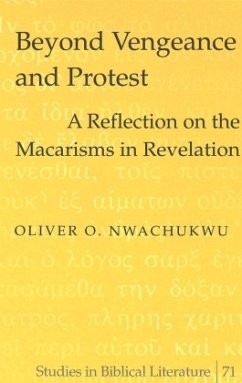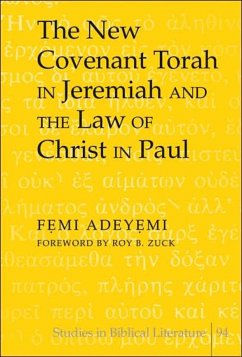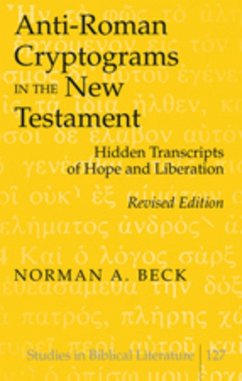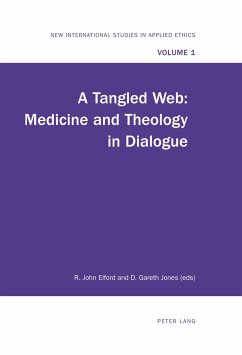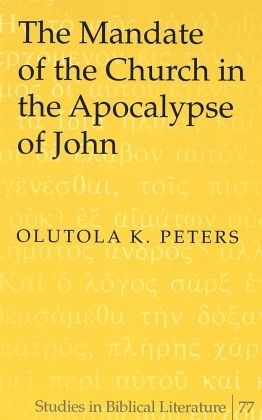
Olutola K. Peters
Gebundenes Buch
The Mandate of the Church in the Apocalypse of John
Versandkostenfrei!
Versandfertig in 6-10 Tagen

PAYBACK Punkte
0 °P sammeln!





The Mandate of the Church in the Apocalypse of John fills a gap in the scholarly literature on the Apocalypse of John by offering a comprehensive discussion of what the Church is called upon to be and do. It delineates various tasks and functions of the Church, showing how they relate to one another and also how they are all unified under the mandate to provide faithful witness to Jesus. With its strong emphasis on the ethical concerns of the Apocalypse, this book challenges the view that John's Apocalypse is sub-Christian in its ethics.
The Author: Olutola K. Peters received his Ph.D. in Biblical studies from McMaster University, Hamilton, Ontario. He is Associate Professor of New Testament and Chair of the Bible and Theology department at Emmanuel Bible College in Kitchener, Ontario.
Produktdetails
- Studies in Biblical Literature 77
- Verlag: Peter Lang
- Artikelnr. des Verlages: 67461
- 1. Auflage
- Seitenzahl: 184
- Erscheinungstermin: 7. Juli 2005
- Englisch
- Abmessung: 236mm x 165mm x 15mm
- Gewicht: 395g
- ISBN-13: 9780820474618
- ISBN-10: 0820474614
- Artikelnr.: 24523060
Herstellerkennzeichnung
Lang, Peter GmbH
Gontardstraße 11
10178 Berlin
r.boehm-korff@peterlang.com
«Fascination with the symbolism of the Book of Revelation has undoubtedly distracted many readers from the message the author wanted to communicate to his readers - and from the tasks to which he intended to summon them. Dr. Peters has wisely drawn our attention to the latter aspect of the text. His treatment of the mandate of the church in the Apocalypse of John is well informed, thorough, and creative. It will be of interest not only to scholars in the field, but also to any who are interested in the abiding message of the Apocalypse.» (Steven Westerholm, Ph. D., Professor of Biblical Studies, Department of Religious Studies, McMaster University, Hamilton Ontario)
«Professor Peters offers a comprehensive study of the whole range of
«Professor Peters offers a comprehensive study of the whole range of
Mehr anzeigen
ethical expectations that the seer of Patmos had for the Asian churches. In a responsible way he explores the various ecclesiological tasks and functions of the churches. A deliberate effort is made to show how the various tasks of the Church are related to one another. Dr. Peters argues cogently that they are unified under the mandate to maintain faithful witness to Jesus, their crucified, risen Lord, who himself was the witness par excellence. Special attention is given to the importance of worship, and also the task of repentance, especially when members of the churches are guilty of failing to execute any of the tasks and functions of the Church with diligence and fervor.
The study concentrates on the internal evidence of John's Apocalypse, but pays careful attention to recent commentaries and monographs on the Apocalypse, and the relevant periodical literature.
The main argument concerning the vital duties of the Church presented in the Apocalypse is clearly presented, the chapters are well organized, and the ethical case describing all the churches were meant 'to be and do'. Convincingly stated, Professor Peters has offered a frontal challenge to the view that John's Apocalypse is sub-Christian in its ethics. He has made a strong case that the seer addressed profound moral and spiritual issues in an integrated and cohesive fashion, highlighting the central importance of the task of the Church in all of its life to bear witness to its Lord.
In a day of renewed interest in apocalyptic thought, it is refreshing to see the relevance of John's Apocalypse unpacked in such a helpful, illuminating way for the Church as it faces the challenges of post-modern thinking.» (Allison A. Trites, Ph. D., Distinguished Professor of Biblical Studies (retired), Acadia Divinity College, Acadia University, Wolfville, Nova Scotia, Canada)
«Taking a contemporary-historical approach to the book of Revelation, Olu Peters examines the ethical task of the Church. He concludes that the mandate of the Church is to maintain a faithful witness to Jesus Christ. This faithful witness is to encompass both word and deed. As a result, Peters analyzes the intersection of witness and worship in Revelation. As exemplified through various liturgical elements, witness is a broad and inclusive task that the Church is called upon to perform. Peters also examines the importance of repentance, by which the Church is called to return to its central task. This volume provides numerous insights into both the book of Revelation and the call of the Church for today.» (Stanley E. Porter, Ph. D., President, Dean and Professor of New Testament, McMaster Divinity College Hamilton, ON Canada)
The study concentrates on the internal evidence of John's Apocalypse, but pays careful attention to recent commentaries and monographs on the Apocalypse, and the relevant periodical literature.
The main argument concerning the vital duties of the Church presented in the Apocalypse is clearly presented, the chapters are well organized, and the ethical case describing all the churches were meant 'to be and do'. Convincingly stated, Professor Peters has offered a frontal challenge to the view that John's Apocalypse is sub-Christian in its ethics. He has made a strong case that the seer addressed profound moral and spiritual issues in an integrated and cohesive fashion, highlighting the central importance of the task of the Church in all of its life to bear witness to its Lord.
In a day of renewed interest in apocalyptic thought, it is refreshing to see the relevance of John's Apocalypse unpacked in such a helpful, illuminating way for the Church as it faces the challenges of post-modern thinking.» (Allison A. Trites, Ph. D., Distinguished Professor of Biblical Studies (retired), Acadia Divinity College, Acadia University, Wolfville, Nova Scotia, Canada)
«Taking a contemporary-historical approach to the book of Revelation, Olu Peters examines the ethical task of the Church. He concludes that the mandate of the Church is to maintain a faithful witness to Jesus Christ. This faithful witness is to encompass both word and deed. As a result, Peters analyzes the intersection of witness and worship in Revelation. As exemplified through various liturgical elements, witness is a broad and inclusive task that the Church is called upon to perform. Peters also examines the importance of repentance, by which the Church is called to return to its central task. This volume provides numerous insights into both the book of Revelation and the call of the Church for today.» (Stanley E. Porter, Ph. D., President, Dean and Professor of New Testament, McMaster Divinity College Hamilton, ON Canada)
Schließen
Für dieses Produkt wurde noch keine Bewertung abgegeben. Wir würden uns sehr freuen, wenn du die erste Bewertung schreibst!
Eine Bewertung schreiben
Eine Bewertung schreiben
Andere Kunden interessierten sich für





